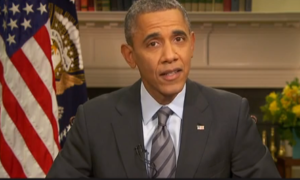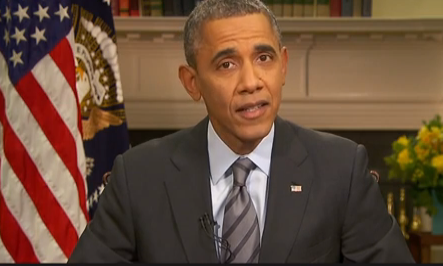BBG Watch Commentary
 U.S. taxpayer-funded Voice of America (VOA) has failed to post a separate report online in English and more than 40 other languages on President Obama’s most extensive public comments to date on the unsettled situation in Ukraine. Earlier, Voice of America had failed to highlight in English and most other languages President Obama’s State of the Union short remark on Ukraine.
U.S. taxpayer-funded Voice of America (VOA) has failed to post a separate report online in English and more than 40 other languages on President Obama’s most extensive public comments to date on the unsettled situation in Ukraine. Earlier, Voice of America had failed to highlight in English and most other languages President Obama’s State of the Union short remark on Ukraine.
If President of the United States speaks for more than three minutes about a foreign country which is very much in the news, such comments deserve a separate report from the Voice of America, rather than a two-paragraph mention in passing in a news report about a related event, but nevertheless about something else. VOA should have also posted a video on its main English news website of President Obama’s comments on Ukraine.
Under VOA Director David Ensor and VOA Executive Editor Steve Redisch, Voice of America has posted recently not just one, but five reports on Justin Bieber, one of them an original VOA video report. Obviously, these VOA executives do not believe that President Obama’s extensive remarks about Ukraine deserved a separate report, much less a report with video.
BBG Watch reported earlier that at the U.S. taxpayers’ funded Voice of America, international audiences can get either news in English and in most of VOA’s other languages about Secretary of State John Kerry’s statements on Ukraine or news about Justin Bierber. They can’t get both and Justin Bieber wins! VOA had failed earlier to report on Kerry’s major statement on Ukraine.
President Obama said Friday the United States hopes that negotiations with Ukraine’s officials and political opposition will lead to “some sort of democratic process that creates a government with greater legitimacy and unity.” He made his comments in a “virtual road trip” across the United States in which he answered questions from around the nation via video links.
As of 1:30 PM EST, Saturday, February 1, 2014, the Voice of America has not posted a separate news report about these extensive comments on Ukraine by President Obama on its websites in more than 40 languages, including English. The only English-language mention of Obama’s comments on Ukraine came in a VOA report, “Top US Diplomat to Meet With Ukrainian Opposition Leaders, VOA,” which had two paragraphs on Obama’s comments on Ukraine, but did not include a video of his comments or references to earlier comments on Ukraine by the White House Press Secretary Jay Carney who condemned violence against journalists and Ukrainian opposition figures.
The only VOA language service reporting in more than passing on President Obama’s comments on Ukraine appears to be its Ukrainian service, which posted both text and video of Obama’s remarks in a separate report.
VOA’s Russian Service has not yet reported online on Obama’s Friday’s comments on Ukraine. A large segment of the population in Ukraine uses Russian as their primary language.
The Ukrainian English-language newspaper Kyiv Post reported that President Obama’s answer came in response to a question Friday about what the United States is doing to support the anti-government EuroMaidan protests that began in November.
Obama speaks for 3 minutes and 30 seconds on the topic, the most extensive comments he’s made publicly on Ukraine’s national crisis, Kyiv Post reported. Obama’s comments on Ukraine come at the six-minute mark in the video. His comments deserved a separate report by VOA in English and in other languages, especially in programs to countries such as Iran and China that lack free media.
President Barack Obama on Ukraine, speaking Jan. 31 in a “virtual road trip” across the United States
“We have been actively engaged in what’s been happening in the Ukraine. Not only has our embassy and our folks who are over there been talking to the opposition as well as the government, but folks like Vice President (Joseph) Biden have spoken directly to President (Viktor) Yanukovych about our belief that, No. 1, rules that restrict protests and free speech are ultimately counterproductive and we are very much against it.
No. 2. There has be a way to restructure the Ukrainian government in a way that allows the voices of the opposition and those folks on the streets to be heard in preparation for some sort of democratic process that creates a government with greater legitimacy and unity. That’s going to be challenging, but we’re trying to help on the negotiations with that.
No. 3, over the long term, part of what’s happened here is that the people of Ukraine are clearly looking to Europe and the West as a partner in a more free, more free-market based economy. Obviously, they also have strong historic ties to Russia and a lot of commercial relationships with Russia and they don’t have to be sacrificed.
I think what people of Ukraine don’t want to see is that, and this is evidenced by what’s happening on the street, is a situation behind closed doors in which their aspirations for a more free society and one that’s integrated with Europe more closely, that that’s foreclosed. This is just one more example of what we’ve seen around the world. It’s very hard for countries to engage in the old-style politics that doesn’t take into account the genuine hopes and aspirations of ordinary people.
With the internet, and smart phones, and with Google and technology and information, people want to be part of determining their own destiny. And you can’t bottle up information in the same way that you used to. Hopefully those in power in Ukraine will recognize that and we can get this resolved peacefully. I’m always worried about the violence and, as I said, we’re engaging on a daily basis in with the Ukrainian government to make sure we can have a positive outcome.”
U.S. taxpayer-funded Voice of America has failed to report at all on Friday’s remarks by White House Press Secretary Jay Carney on Dmytro Bulatov, a missing Ukrainian opposition activist who resurfaced on Thursday night with signs of having been severely beaten and tortured.
At a BBG board meeting last December, Armstrong sharply questioned Voice of America director David Ensor about numerous failures in VOA news reporting. Ensor blamed it on inadequate resources, but critics say that the news reporting crisis at VOA is largely caused by mismanagement and lack of leadership on the part of Ensor and his top deputy Steve Redisch who holds the title of VOA Executive Editor.
Audiences abroad no longer have a good reason to go to the VOA English website to get hard news about the United States. Many VOA journalists are appalled by this programming policy, but VOA Director David Ensor stated recently that “Voice of America is not a propaganda organization and it is not a mouthpiece of the White House or of anybody else.” “It is a proud journalistic organization more than seventy years old,” Ensor added.
Many VOA journalists believe that David Ensor’s statement is just an excuse for bad management and not reporting clearly and comprehensively significant news about U.S. foreign policy. Some also see it as an excuse for ignoring the VOA Charter, which is public law in the United States, and which says that “VOA will present the policies of the United States clearly and effectively, and will also present responsible discussions and opinion on these policies.”
